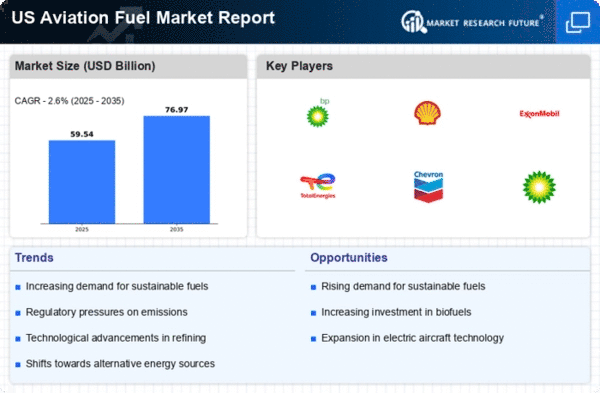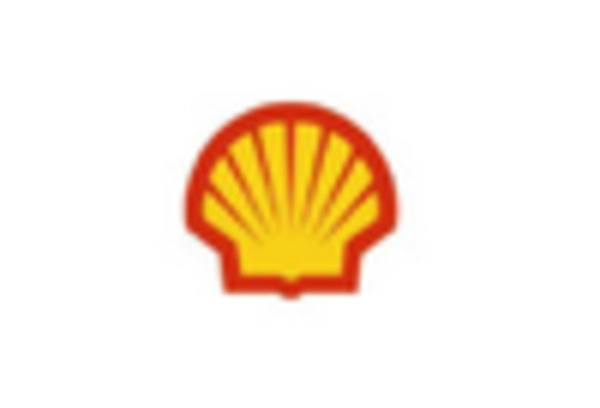Increasing Air Travel Demand
The aviation fuel market is experiencing a notable surge in demand due to the increasing air travel activities across the United States. As more individuals and businesses opt for air travel, the need for aviation fuel escalates. In 2025, the number of domestic flights is projected to rise by approximately 5%, leading to a corresponding increase in fuel consumption. This trend is further supported by the expansion of low-cost carriers, which are making air travel more accessible. Consequently, the aviation fuel market is likely to witness heightened competition among fuel suppliers, driving innovation and efficiency in fuel production and distribution. The growing demand for air travel not only impacts fuel consumption but also influences pricing strategies within the aviation fuel market, as suppliers strive to meet the needs of an expanding customer base.
Strategic Partnerships and Collaborations
Strategic partnerships and collaborations among stakeholders in the aviation fuel market are becoming increasingly prevalent. Airlines, fuel suppliers, and technology providers are joining forces to enhance fuel efficiency and sustainability. These collaborations often focus on research initiatives aimed at developing innovative fuel solutions and optimizing supply chains. For instance, partnerships between airlines and biofuel producers are facilitating the integration of sustainable fuels into existing operations. The aviation fuel market is likely to benefit from these alliances, as they foster knowledge sharing and resource pooling. Such strategic collaborations not only enhance operational efficiencies but also contribute to the overall sustainability goals of the aviation sector. As stakeholders work together, the potential for groundbreaking advancements in fuel technology and distribution methods may emerge, further shaping the future of the aviation fuel market.
Technological Innovations in Fuel Production
Technological advancements in fuel production are playing a crucial role in shaping the aviation fuel market. Innovations such as advanced refining techniques and the development of alternative fuel sources are enhancing the efficiency and sustainability of aviation fuels. For instance, the introduction of new catalytic processes has improved the yield of jet fuel from crude oil, potentially reducing production costs. Furthermore, the aviation fuel market is witnessing a rise in research and development efforts focused on creating sustainable aviation fuels (SAFs) that can significantly lower lifecycle emissions. As these technologies mature, they may lead to a more competitive market landscape, where suppliers can offer a diverse range of fuel options to airlines. The ongoing investment in technology not only addresses environmental concerns but also positions the aviation fuel market for future growth and resilience.
Regulatory Changes and Environmental Policies
The aviation fuel market is significantly influenced by evolving regulatory frameworks and environmental policies aimed at reducing carbon emissions. In the United States, the implementation of stricter emissions standards is prompting airlines to seek more efficient fuel options. The Federal Aviation Administration (FAA) has set ambitious targets for reducing greenhouse gas emissions, which could lead to a shift in fuel sourcing and technology. As a result, the aviation fuel market is likely to see increased investment in sustainable fuel alternatives, such as biofuels and synthetic fuels. These regulatory changes not only affect fuel production but also create opportunities for innovation within the market. The potential for government incentives for cleaner fuels may further stimulate growth in this sector, encouraging suppliers to adapt to the changing landscape of aviation fuel requirements.
Economic Recovery and Growth in Freight Transport
The aviation fuel market is poised for growth as the economy recovers and freight transport activities expand. The resurgence of e-commerce and global trade is driving an increase in air cargo services, which in turn boosts the demand for aviation fuel. In 2025, air freight volumes are expected to rise by approximately 4%, reflecting the growing reliance on air transport for time-sensitive goods. This trend is likely to benefit the aviation fuel market, as fuel suppliers adapt to the changing dynamics of air transport. The increased demand for cargo flights not only influences fuel consumption patterns but also impacts pricing strategies, as suppliers seek to optimize their offerings for both passenger and freight sectors. The economic landscape thus presents a dual opportunity for growth within the aviation fuel market.
















